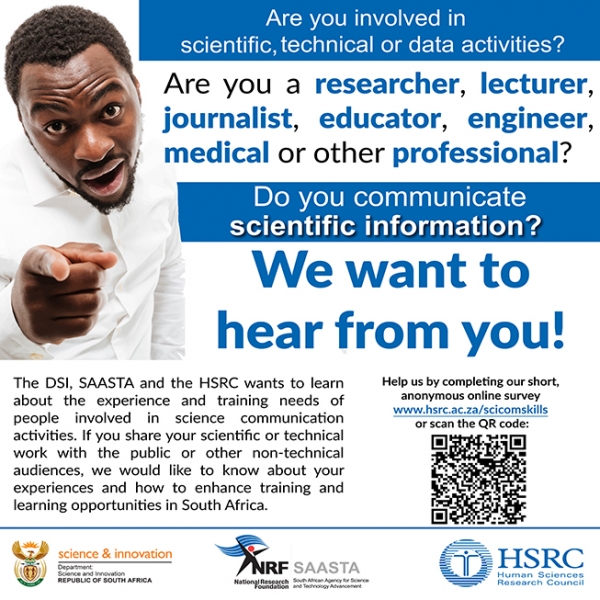Are you involved in scientific, technical or data activities?
DATE: 17 May 2022
ARE YOU A RESEARCHER, LECTURER, SCIENTIST, JOURNALIST, EDUCATOR, ENGINEERING, MEDICAL OR OTHER PROFESSIONAL?
DO YOU COMMUNICATE SCIENTIFIC INFORMATION?
WE WANT TO HEAR FROM YOU.
Communicating science involves sharing, communicating, popularising, educating and raising awareness of a variety of topics. These may include areas related to public health and safety, new infrastructure development or serve more directed educational or entertainment purposes. While these are often targeted to public audiences – increasingly science communication has expanded to include other professionals and non-technical audiences toward developing shared understanding and an appreciation for scientific and technical work within a variety of disciplines.
As the world moves to adopt more digital and virtualised engagement modes, the role of effective science communication becomes increasingly more important. Many jobs require a direct or indirect form of science communication in practice, where researchers and other professionals communicate scientific information to non-technical audiences. These may be community or public audiences, stakeholders to research, decision or policy makers as well as non-technical experts who rely on scientists, academics and researchers to make science more accessible.
These science communication roles are often filled by scientists and researchers – however may also include activities by teachers, activists, academics, broadcasters, government employees, professionals, community leaders and citizens involved in informal scientific activities. While these individuals are often employed at universities, science councils, within government or other areas of public service, a great deal of science communication activities occur within the private and not-for-profit sectors. Recent examples of this may include information related to technical activities involving engineering developments and natural disasters or issues related to medical information in light of COVID 19 as well as other areas where scientific information is shared.
The DSI, SAASTA and the HSRC wants to learn about the experience and training needs of people involved in science communication activities. If you share scientific or technical work with the public or other non-technical audiences, we would like to know about your experiences and how to enhance training and learning opportunities for you as these modes of engagement continue to expand.
Help us by completing our short, anonymous survey www.hsrc.ac.za/scicomskills
To download the dissemination toolkit please click on the link below:
- Download dissemination toolkit (in pdf format)


